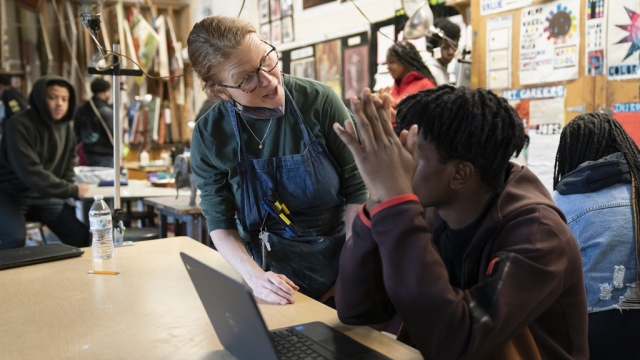Teacher pay is on the rise — at least that's what over half of U.S. governors are aiming for. But it begs the question: Is it too little, too late?
"Our teachers are making 6.4% less today than they did 10 years ago," said Becky Pringle, National Education Association president.
Pringle is helping the teacher's union in the fight for bigger teacher salaries.
"We have been advocating across the country to focus in on the salaries of our teachers and our support staff," she said. "But it's not making up for the years of disinvestment and the reality that when we adjust for inflation, they still struggle to take care of their families without having another job."
Last school year, the national average for public school teacher salaries was just under $67,000 a year, only a 2% increase from the school year before.
This year, 26 governors have advocated for boosting teacher's salaries.
"We're seeing governors on both sides of the aisle talking about the need to, and taking action to, raise teachers' salaries," Pringle said.
President Joe Biden even addressed it in his State of the Union.
"Teachers have a wage-penalty gap that means that they make 25% less than other professions that have the same level of education and the same level of experience," Pringle said.
According to the Economic Policy Institute, in 2021 that gap was 23.5%. Teachers earned an average of 76.5 cents for every dollar that other professionals with the same level of education earned.
SEE MORE: The Cost Of Being A Teacher
And it's not just the teachers.
In March, thousands of Los Angeles Unified School District service workers — including custodians, bus drivers and cafeteria workers — went on a three-day strike. It stopped classes for more than a half-million kids in the country's second largest school district.
One of the workers' demands was better pay. Their average salary was just $25,000.
Low wages like that have forced many teachers to rethink and even leave the profession, adding to the teacher shortage that was already worsened by the pandemic.
"How can we make it better? What can we do to stop you from leaving the profession?" Pringle said. "When we did our survey and found that 55% of our educators were planning on leaving the profession, we were horrified, and everyone should be horrified by that."
Pringle says fixing the problem starts with one word: Respect.
"Respect them by giving them a professional salary, but we don't stop there," she said. "They talk about respecting them as professionals so that they have the authority and the collaborative autonomy to make the teaching and learning decisions that are best for our students. We finally have to at every level of government put our money where our mouths are. We can't just talk about appreciation this year; we have to talk about action."
Trending stories at Scrippsnews.com



